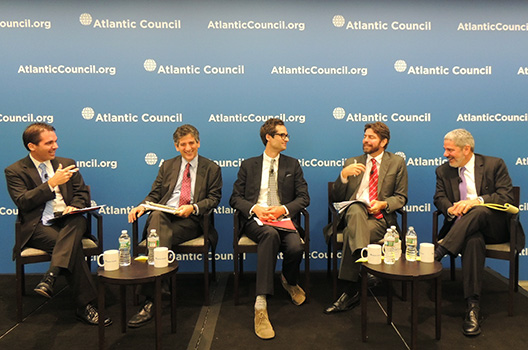 On October 28th, 2014, the Adrienne Arsht Latin America Center in partnership with the Inter-American Dialogue brought together a dynamic panel to explore Brazil’s road ahead, including John Prideaux, The Economist’s Washington correspondent and former Brazil bureau chief from 2007-2010; Andrew Gunther, managing director of infrastructure for Darby Overseas Investments; Ricardo Sennes, nonresident senior Brazil fellow at the Atlantic Council and managing partner of Prospectiva; Peter Schechter, director of the Adrienne Arsht Latin America Center; and moderator Jason Marczak, deputy director of the Latin America Center.
On October 28th, 2014, the Adrienne Arsht Latin America Center in partnership with the Inter-American Dialogue brought together a dynamic panel to explore Brazil’s road ahead, including John Prideaux, The Economist’s Washington correspondent and former Brazil bureau chief from 2007-2010; Andrew Gunther, managing director of infrastructure for Darby Overseas Investments; Ricardo Sennes, nonresident senior Brazil fellow at the Atlantic Council and managing partner of Prospectiva; Peter Schechter, director of the Adrienne Arsht Latin America Center; and moderator Jason Marczak, deputy director of the Latin America Center.
After securing a narrow victory of only 3 percentage points in the Brazilian elections on October 26, re-elected President Dilma Rousseff will have to make significant changes to respond to the discontent of more than 51 million voters who supported challenger Aècio Neves. Those changes include financial adjustments, overcoming corruption and impunity, responding to social demands of the rising middle class, and a building a strategic foreign policy.
Here are the main takeaways from the expert panel:
- The tough presidential election revealed a changing political environment in Brazil that is increasingly more fragmented. Now more than ever, it is essential that Dilma bolster her ability to govern diverse groups, especially considering that the Worker’s Party (PT) holds less than 14 percent of the seats in Congress. This scenario will push Dilma to create a broader coalition which includes realigning with former president Lula da Silva’s circle.
- Economic adjustments must be the number one priority for Dilma. The narrow victory communicated a message that voters want change. One of the first changes will have to be the appointment of a new minister of finance. Another major focus will likely be developing a new investment and competitiveness model for Brazil.
- Allegations of corruption will be an immediate challenge in Dilma’s new term. The recent scandal with Petrobras, Brazil’s state-owned oil company, could implicate members of her government and will make for a tough road when trying to rally widespread coalition support.
- Foreign policy will be another big issue requiring realignment. Contrary to Lula da Silva’s more traditional and ideologically-driven foreign policy vision, Dilma has tended to foster a more commercial emphasis in international affairs by defending Brazil’s companies abroad. Even so, she has a lot of work to do to regain the trust of global markets and reenergize relations that have fallen cold, particularly with the United States. US-Brazil relations will require an agenda that unifies both countries on issues such as energy, technology, innovation, and trade.
